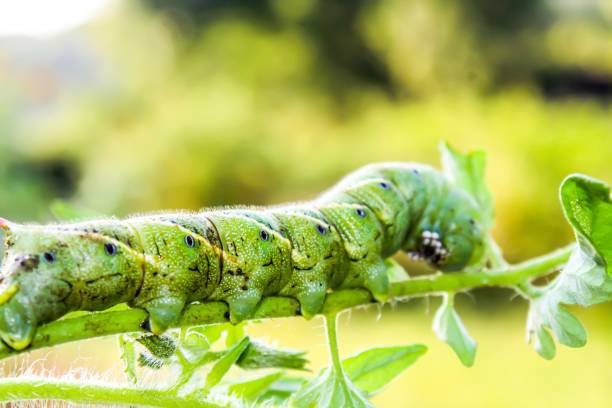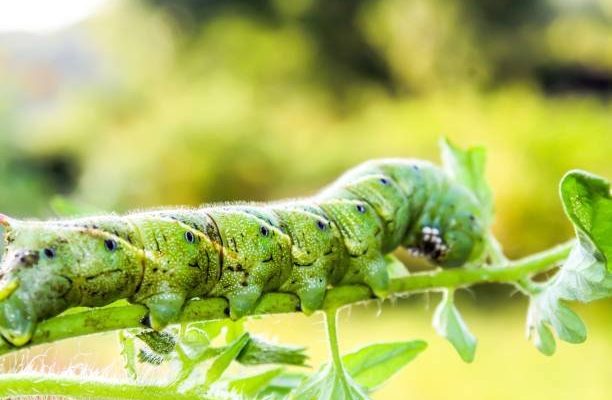
Diatomaceous earth (often abbreviated as DE) is a powdery substance made from the crushed remains of tiny aquatic organisms called diatoms. When sprinkled around your plants, it acts as a barrier against pests, including those pesky hornworms. The beauty of using diatomaceous earth is that it’s safe for your pets and plants, making it a go-to for many organic gardeners. So, let’s dive into hornworm control with diatomaceous earth and how to use it effectively in your garden.
What Are Hornworms?
Hornworms are the larvae of specific moth species, mainly the tobacco hornworm and the tomato hornworm. You might be wondering what makes these caterpillars such a nuisance. The answer lies in their appetite. These little guys can munch through leaves and even fruit in a matter of days, leaving your plants stripped bare.
They’re usually green, which helps them camouflage among the leaves. Although they’re not harmful to humans, if left unchecked, they can cause significant damage to your vegetable garden. You might even find them hiding under the leaves, making them tricky to spot. Their voracious eating habits and stealthy nature is exactly why gardeners need a reliable way to control them.
Why Choose Diatomaceous Earth?
So, why opt for diatomaceous earth over chemical pesticides? Here’s the thing: DE is a natural insecticide that’s effective without the harmful side effects that come with synthetic options. It’s made from natural materials and works by dehydrating insects upon contact. When hornworms crawl over the DE, the tiny particles scratch their exoskeleton, which leads to moisture loss and ultimately, death.
Another major advantage is that diatomaceous earth targets a wide range of pests. Not only will it help control hornworms, but it can also deter other unwanted visitors like aphids, beetles, and slugs. It’s great for maintaining a healthy ecosystem in your garden while keeping your plants safe.
How to Apply Diatomaceous Earth
Applying diatomaceous earth may seem straightforward, but there are a few key steps to ensure it’s effective. Here’s a simple guide to get you started:
- Choose the Right Time: It’s best to apply DE during dry weather, as moisture can reduce its effectiveness. Early morning or late afternoon can be ideal times.
- Wear Protective Gear: While DE is safe for plants and pets, inhaling the fine powder can irritate your lungs. Consider wearing a dust mask and goggles.
- Even Application: Using a garden duster or a fine sieve helps in spreading a thin, even layer around the base of your plants. Make sure to cover the leaves as well, since hornworms tend to hide there.
- Reapply After Rain: Since diatomaceous earth loses its effectiveness when wet, you’ll need to reapply it after it rains or if water splashes it off.
By following these steps, you can create a barrier that hornworms won’t want to cross.
Choosing the Right Type of Diatomaceous Earth
Not all diatomaceous earth is created equal. When shopping for DE, you’ll encounter two main types: food-grade and pool-grade.
– **Food-Grade DE:** This is the type you want for your garden. It’s safe for plants and pets, and it can even be consumed by humans in small amounts. Food-grade diatomaceous earth is effective against pests while being gentle on the environment.
– **Pool-Grade DE:** This type is used in swimming pools for filtration purposes and is treated with chemicals that make it unsafe for human or animal contact. Avoid this type for garden use!
You can usually find food-grade diatomaceous earth at garden centers, home improvement stores, or online. Always read the labels to ensure you’re buying the right kind.
Other Benefits of Diatomaceous Earth
Besides controlling hornworms, diatomaceous earth offers several other benefits for your garden:
– **Soil Health:** DE can improve soil aeration and moisture retention, which is great for plant growth. It helps create a healthier environment for your plants to thrive.
– **Natural Fertilizer:** As DE breaks down, it enriches the soil with beneficial minerals like silica, which is essential for plant health.
– **Pest Prevention:** By regularly applying diatomaceous earth, you can deter not just hornworms but other pests as well, reducing the need for chemical interventions.
These added benefits make diatomaceous earth a versatile tool to have in your gardening arsenal.
Common Mistakes to Avoid
When using diatomaceous earth, a few common pitfalls might diminish its effectiveness:
– **Overlooking Moisture:** As we mentioned earlier, DE loses its potency when wet. If you forget to reapply after rain or watering your garden, you might find hornworms making a comeback.
– **Too Much or Too Little:** Applying too much DE can create a thick barrier that’s not as effective. On the flip side, not applying enough won’t offer the protection you need. Aim for a thin, even layer for the best results.
– **Ignoring Other Pest Control Methods:** While DE is a great option, it works best as part of an integrated pest management plan. Combine it with natural predators like ladybugs or manual removal of hornworms for even better results.
By avoiding these mistakes, you’ll set yourself up for success in keeping those hornworms at bay.
Diatomaceous earth is a fantastic resource for any gardener grappling with hornworms. It’s a natural, effective, and environmentally friendly way to keep your plants safe from these pesky pests. By knowing how to apply it correctly, choosing the right type, and understanding the additional benefits it brings, you can create a thriving garden in no time.
So next time you spot a hornworm lurking in your garden, you’ll be armed with the knowledge to fight back. With a sprinkle of diatomaceous earth, you can protect your plants and enjoy the fruits of your labor without the worry of costly crop damage. Happy gardening!

